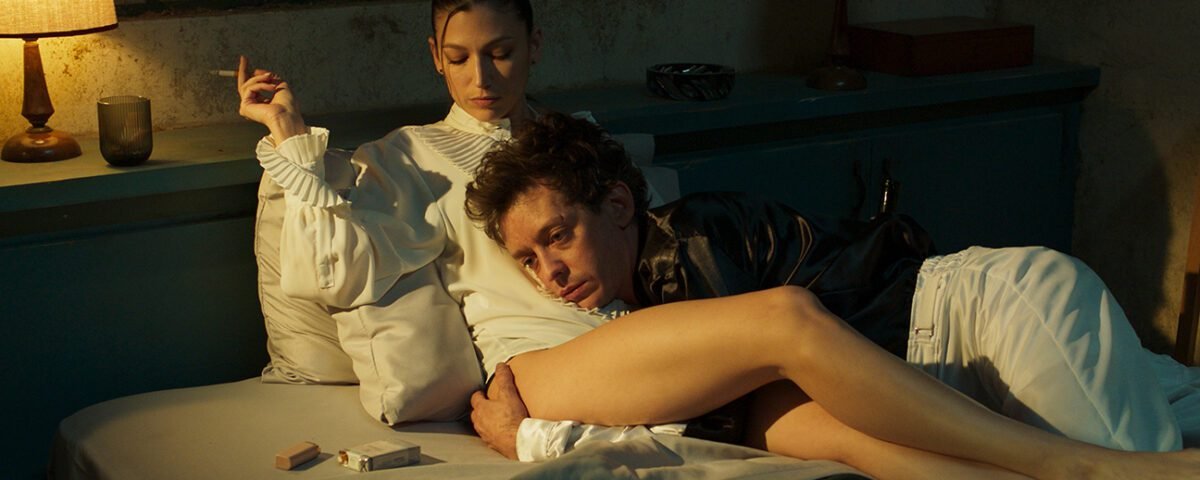


‘Afraid’ Review: John Cho and Katherine Waterston Star in Chris Weitz’s Bland AI-Themed Horror Flick
August 30, 2024


‘September 5’ Review: Peter Sarsgaard Stars in a Gripping Newsroom Thriller About the 1972 Munich Terrorist Attacks
August 31, 2024Premiering in Venice, the surreal comedy-thriller from director Luis Ortega stars Nahuel Pérez Biscayart as an equestrian who discovers his feminine side after a devastating accident.
Kill the Jockey
Heavy on style, light on character.
Nahuel Pérez Biscayart (BPM) stars as a troubled jockey whose identity shifts radically after a serious accident on the track in Kill the Jockey (El Jockey), a Venice Film Festival entry by Argentinian director Luis Ortega (El Angel, Dromómanos). Visually lush and full of playful mystery, this equestrian-themed psychological thriller-comedy-whatsit strikes plenty of poses that may tickle the fancy of viewers with a taste for camp, surrealism and/or the absurd. However, others might feel underwhelmed by the film’s strenuous efforts to charm and find it slows to a trot by the end.
That retro aesthetic is further buttressed by production and costume design choices that evoke the 1950s or ’60s, especially in the cut of the men’s suits and the peculiar getup Biscayart’s lead character sports for much of the film: a full-length mink coat with dainty bracelet sleeves and a tightly wrapped, padded bandage around his head that evokes the shape of a snug pillbox hat.
As Remo prepares for a race, it becomes clear his drinking is out of control. At one event, he barely gets out of the starting gate. The rider of the winning horse is Abril (Úrsula Coberó, Money Heist) his professional rival but also his lover. Together, they celebrate their victory with a delightfully herky-jerky disco pas de deux that’s like to be the moment viewers will remember best long after the film is finished. We soon learn that Abril is pregnant with Remo’s baby, though her stony expression suggests she’s not all that bothered with whether the permanently sozzled Remo is involved in the parenting. Meanwhile, another jockey, Ana (Mariana Di Girolamo) makes her romantic interest in Abril very clear, adding a sweet sapphic dimension to the story.
Despite the fact that Remo is a total screwup, Sirena insists he rides his latest acquisition, a stunning chestnut stallion named Mishima imported from Japan, in the next big race. This time, Remo manages to make it out of the gate. But just after he takes the lead he veers off and, based on the horse’s POV camera, rides right into the fence, severely injuring himself. (And probably poor Mishima, although the horse is sadly never mentioned again.) Remo wakes up in the hospital with amnesia, barely able to say a word at first, let alone his own name. After stealing the aforementioned fur coat and a pocketbook belonging to another patient, he walks out into the streets of Buenos Aires.
The rest of the film evolves into a picaresque of semi-comic encounters as Remo, who renames himself Dolores and adopts she/her pronouns, discovers his feminine side. Presumably, this is all meant to illustrate the plasticity of gender identity or the fragility of modern masculinity. Or maybe it’s all just a lark. The screenplay, by Ortega, Rodolfo Palacios and Fabián Casas, is light on queer theory or even character motivation. But the comely cast, who contribute admirably athletic, physical performances across the board, have enough charisma and vigor to keep this not-especially-long film jaunty. In the end, it all feels a bit like a fashion film or some other branded exercise in style — except that the brand is Ortega’s peculiar and unique vision.





